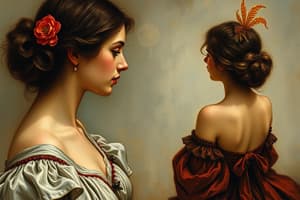Podcast
Questions and Answers
What is primarily represented by the artist's task in relation to the environment?
What is primarily represented by the artist's task in relation to the environment?
- Documenting events for historical accuracy
- Capturing and enhancing human activities (correct)
- Expressing emotions without regard to the environment
- Creating art as merely decorative pieces
Which aspect of art is emphasized as making it timeless?
Which aspect of art is emphasized as making it timeless?
- The artist's personal life story
- The cultural context it is produced in
- The experiences it conveys (correct)
- The materials used in creating art
Which of the following is NOT mentioned as a subject of art?
Which of the following is NOT mentioned as a subject of art?
- Politics (correct)
- Landscapes
- Fruits
- Animals
What role does art play in relation to the unknown?
What role does art play in relation to the unknown?
When assessing personal artwork choices, which of the following categories are suggested?
When assessing personal artwork choices, which of the following categories are suggested?
How does art influence society?
How does art influence society?
What is a fundamental characteristic that differentiates art from nature?
What is a fundamental characteristic that differentiates art from nature?
In the concept of 'Art as experience,' what must the creator possess for their work to have validity?
In the concept of 'Art as experience,' what must the creator possess for their work to have validity?
Which category of art primarily appeals to the sense of sight?
Which category of art primarily appeals to the sense of sight?
Which of the following is NOT a characteristic of literary art?
Which of the following is NOT a characteristic of literary art?
What is the goal of applied art?
What is the goal of applied art?
What does art fundamentally represent according to the content?
What does art fundamentally represent according to the content?
Which of the following is an example of plastic art?
Which of the following is an example of plastic art?
What is the Latin origin of the word 'art'?
What is the Latin origin of the word 'art'?
Which of the following best describes art as an expression?
Which of the following best describes art as an expression?
Which statement reflects a philosopher's view on art?
Which statement reflects a philosopher's view on art?
What does the term 'OBRA MAESTRA' refer to in the context of art?
What does the term 'OBRA MAESTRA' refer to in the context of art?
How is art categorized according to the assumptions presented?
How is art categorized according to the assumptions presented?
Which of the following best captures the universal nature of art?
Which of the following best captures the universal nature of art?
According to the content, what assumption is NOT associated with art?
According to the content, what assumption is NOT associated with art?
What does the statement 'Art brings life in harmony with the beauty of the world' suggest?
What does the statement 'Art brings life in harmony with the beauty of the world' suggest?
Study Notes
What is Art?
- Art originates from the Latin word "artis/ars," meaning "to make/to create."
- Art is a piece of the artist, a form of communication, and an expression of creative imagination and beauty.
- It's a combination of creativity (purposive action) and imagination (limitless thought).
Nature of Art
- Art, especially a masterpiece ("Obra Maestra"), is considered beautiful.
- Masterpieces can be commercially successful, groundbreaking, symbolically meaningful, or inherently beautiful.
Philosophers' Definitions of Art
- Plato: Art harmonizes life with the world's beauty.
- Ruskin: Art embodies the whole human spirit.
- Charleton Noyes: Art is the artist's communication with others.
- Collins and Riley: Art is anything human-made that evokes beauty.
Assumptions of Art
- Art is universal (found in every society) and cultural (influencing society).
- Art is not natural (it's human-made and often involves tools or knowledge).
- Art as experience: Art creation requires personal, knowledgeable value and a subjective link between creator and creation.
- Art is expression: It conveys feelings, beliefs, and character.
Categories/Genres of Art
- Visual Art: Appealing to sight.
- Graphic: Two-dimensional (paintings, drawings, sketches, illustrations).
- Plastic: Three-dimensional (architecture, sculpture).
- Audio-Visual Art: Products of performance talent (theater, dance, singing).
- Literary Art: Written art.
- Prose: Ordinary writing.
- Poetry: Rhyming, uses figurative language.
- Applied Art: Design and decoration of everyday objects (filmmaking, photography, fashion design).
Subjects of Art
- Art's subject matter is diverse: nature, people, emotions, places, animals, events, religious figures, landscapes, seascapes, etc.
The Artist's Task
- Artists show humanity's relationship with the environment, create functional spaces, enhance ordinary objects, record/commemorate events, and give form to the unknown.
Conclusion
- Art is timeless and always an experience.
Studying That Suits You
Use AI to generate personalized quizzes and flashcards to suit your learning preferences.
Related Documents
Description
Explore the fundamental concepts of art, its nature, and the definitions offered by various philosophers. This quiz delves into the definition of art, the significance of masterpieces, and the cultural implications of artistic expression. Test your knowledge on how art reflects human creativity and beauty.




